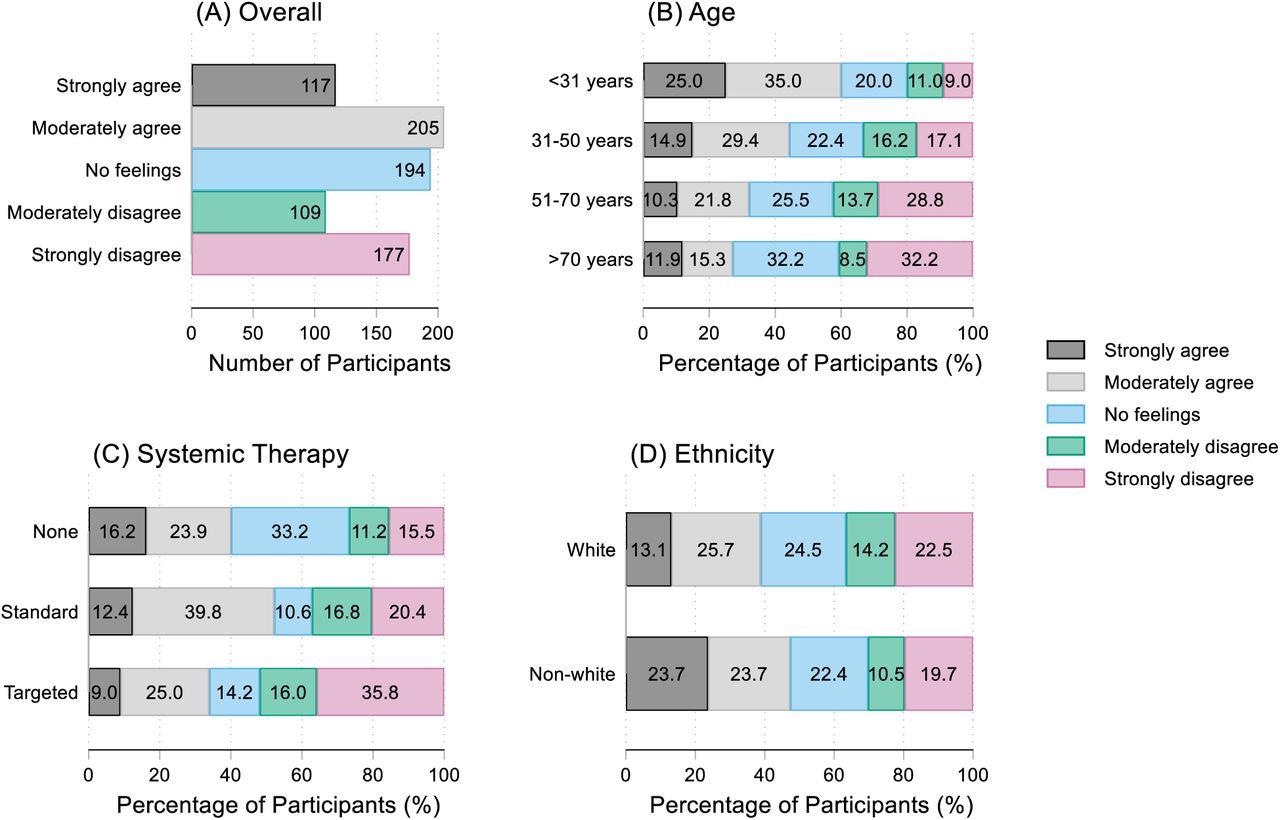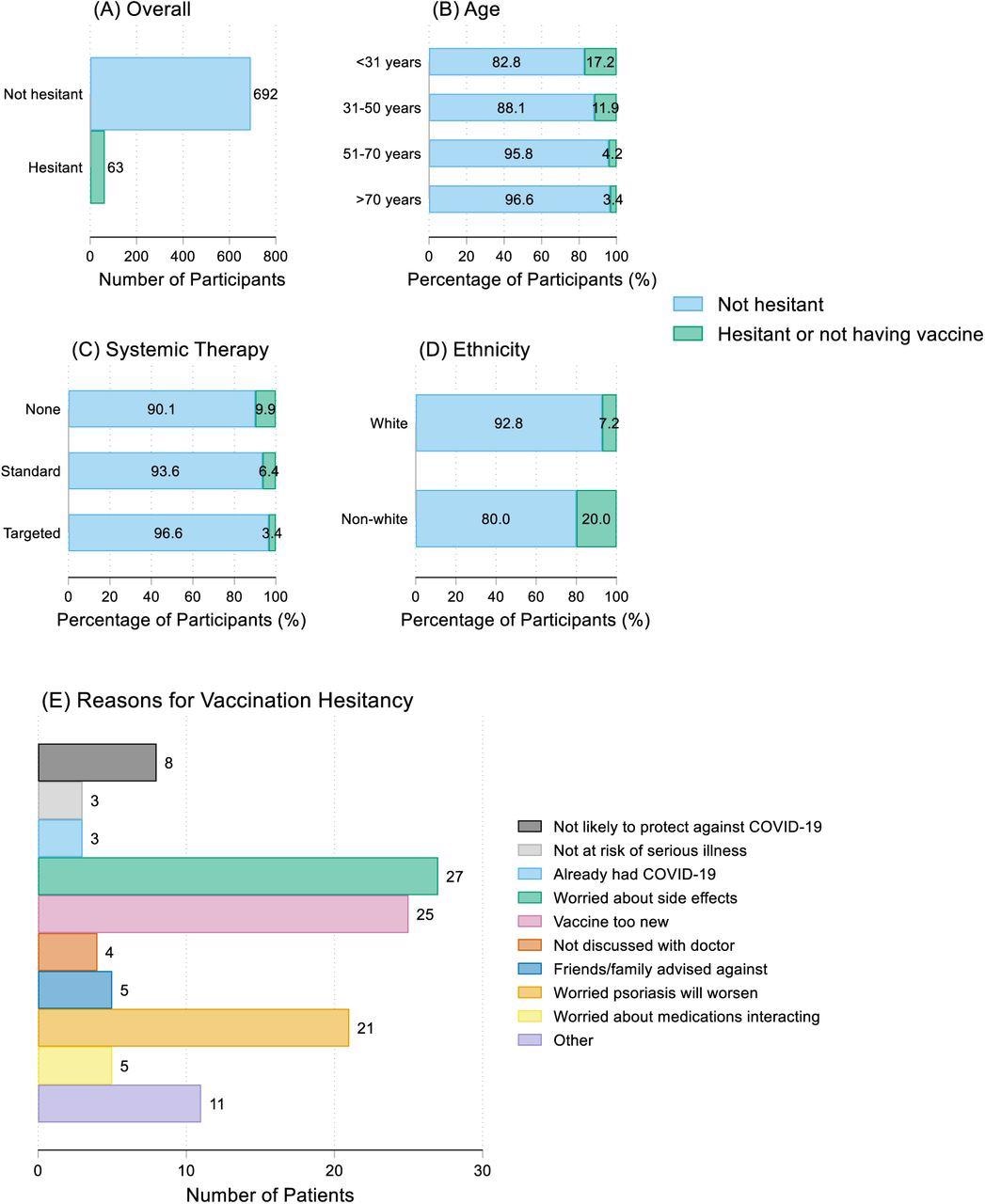About 40% of people living with psoriasis have had delays to psoriasis treatment and care from the COVID-19 pandemic, according to a new study posted to the medRxiv* server. People of younger age and belonging to an ethnic minority group were more likely to be affected by these disruptions to care.

 This news article was a review of a preliminary scientific report that had not undergone peer-review at the time of publication. Since its initial publication, the scientific report has now been peer reviewed and accepted for publication in a Scientific Journal. Links to the preliminary and peer-reviewed reports are available in the Sources section at the bottom of this article. View Sources
This news article was a review of a preliminary scientific report that had not undergone peer-review at the time of publication. Since its initial publication, the scientific report has now been peer reviewed and accepted for publication in a Scientific Journal. Links to the preliminary and peer-reviewed reports are available in the Sources section at the bottom of this article. View Sources
Interestingly, being younger and from an ethnic minority group was associated with higher COVID-19 hesitancy among people with psoriasis and is consistent with the demographic of vaccine-hesitant people in the general population. People who were vaccine-hesitant cited concerns about the vaccine being developed so quickly and vaccine side effects potentially worsening their psoriasis.
People with psoriasis are at a high risk of developing severe COVID-19 symptoms because of their frequent use of immunosuppressive medication. Understanding the disruption of psoriasis care brought on from the COVID-19 pandemic and its impact on vaccine hesitancy may help doctors in their conversations with vaccine-hesitant patients.
“Identification of disenfranchised individuals and addressing their concerns regarding the COVID-19 vaccine will help to mitigate risks from the ongoing pandemic,” concluded the research team.
Study design and data collection
Starting on May 4, 2020, the research team distributed an online survey called PsoProtectMe for people with psoriasis via social media, patient organizations related to psoriasis, and clinical networks.
The team modified the questionnaire on May 2021 to ask questions about their views on the impact the COVID-19 pandemic had on psoriasis care and their perspective on the immunosuppressant-associated risks of taking any of the COVID-19 vaccines.
The questions were designed for people to self-report their level of COVID-19 vaccine hesitancy and the factors contributing to this decision ranging from concerns over the materials in the vaccine to feeling protected after recovering from a COVID-19 infection.

Extent to which participants feel their psoriasis care has been affected by the COVID-19 pandemic. (A) overall count. (B) by age group; <31 years: n=100, 31-50 years: n=228, 51-70 years: n=271, >70 years: n=59. (C) by treatment type; no systemic therapy: n=419; standard systemic therapy: n=113; targeted therapy: n=212. (D) by ethnicity; white: n=579; non-white: n=76.
Younger people experienced more barriers to care during the COVID-19 pandemic
A total of 802 individuals with psoriasis completed the survey. The research team collected responses from 89 countries — with 69% coming from the United Kingdom — and 81.7% of people included demographic information.
About 40 percent of people reported disruptions to their psoriasis care. People who were younger, at a median age of 44, were more likely to experience delays in treatment than older individuals (average age being 54 years). Being of a non-white ethnicity was also associated with limited access to psoriasis care.

COVID-19 vaccine hesitancy. (A) overall count. (B) by age group; <31 years: n=93; 31-50 years: n=219; 51-70 years: n=261; >70 years: n=58. (C) by treatment; no systemic therapy: n=406; standard systemic therapy: n=110; targeted therapy: n=207. (D) by ethnicity; white: n=559; non-white: n=70. (E) reasons for vaccine hesitancy.
People who experienced problems accessing psoriasis care had a shorter duration with psoriasis — likely because of their age — and more severe psoriasis symptoms.
While a majority of survey takers were taking similar amounts of systemic medications, those who had targeted immunosuppressant therapies experienced more medical disruptions.
Increased risk perception for severe COVID-19 infection
A section of the survey involved asking people how concerned they were about getting sick from severe acute respiratory syndrome coronavirus 2 (SARS-CoV-2) and how they felt about their medication affecting COVID-19 recovery.
About 325 individuals reported taking immunosuppressive medication, and more than half of them (55.1%) said they felt their medication — the majority being targeted therapy — made them more susceptible to getting sick. Additionally, 56.3% said their medication would make it difficult to recover from a COVID-19 infection.
During the COVID-19 infection, 35% were prescribed systemic therapy and 65% were prescribed targeted therapy alone or in combination with other therapies. About 17% stopped their treatment during the pandemic.
Concerns over side effects from COVID-19 vaccine
Of the 755 people who answered questions on COVID-19 vaccines, 80.9% said they had received at least one vaccine dose. In vaccinated people with psoriasis, 16.2% reported their psoriasis got worse after immunization, with more than half saying changes occurred within two weeks.
There were 8.3% of people with psoriasis who refused to take the COVID-19 vaccine or not planning to take it. Vaccine-hesitant people were more likely to be younger, have lower BMI, or have shorter disease duration. They were also less likely to take systemic immunosuppression medications.
The three most common reasons for vaccine hesitancy were concerns over vaccine side effects, the vaccine being too ‘new,’ and fear of their psoriasis worsening after immunization.

 This news article was a review of a preliminary scientific report that had not undergone peer-review at the time of publication. Since its initial publication, the scientific report has now been peer reviewed and accepted for publication in a Scientific Journal. Links to the preliminary and peer-reviewed reports are available in the Sources section at the bottom of this article. View Sources
This news article was a review of a preliminary scientific report that had not undergone peer-review at the time of publication. Since its initial publication, the scientific report has now been peer reviewed and accepted for publication in a Scientific Journal. Links to the preliminary and peer-reviewed reports are available in the Sources section at the bottom of this article. View Sources
Journal references:
- Preliminary scientific report.
Bechman K, et al. (2022). Vaccine hesitancy and access to psoriasis care in the COVID-19 pandemic: findings from a global patient-reported cross-sectional survey. medRxiv. Doi: https://doi.org/10.1101/2022.01.20.22269546, https://www.medrxiv.org/content/10.1101/2022.01.20.22269546v1
- Peer reviewed and published scientific report.
Bechman, Katie, Emma S. Cook, Nick Dand, Zenas Z.N. Yiu, Teresa Tsakok, Freya Meynell, Bolaji Coker, et al. 2022. “Vaccine Hesitancy and Access to Psoriasis Care during the COVID ‐19 Pandemic: Findings from a Global Patient‐Reported Cross‐Sectional Survey.” British Journal of Dermatology 187 (2): 254–56. https://doi.org/10.1111/bjd.21042. https://academic.oup.com/bjd/article/187/2/254/6700255.